|
Nick of Time
A splendid Christmas present arrived on Christmas Eve from my new best friends at Brash Books of Kansas, in the form of their sparkling new editions of thrillers from the Swinging Sixties by Jimmy Sangster, who is probably better known as a scriptwriter and director for Hammer films (including Dracula Prince of Darkness and Lust for a Vampire).

Touchfeather and Touchfeather Too feature Katy Touchfeather, a sexually liberated (for the 1960s) British spy whose cover is as an air hostess on international flights. They are very much in the vein of John Gardner’s Boysie Oakes books of the same period and great fun despite occasional cringeworthy jokes such as ‘(the village of) Cumming-on-Hardy was as difficult to get to as it sounded...’
Br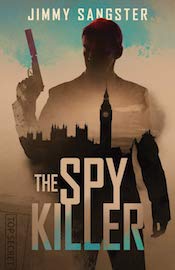 ash Books had also republished Sangster’s brace of novels featuring reluctant British spy John Smith: The Spy Killer (originally title Private I) and Foreign Exchange. ash Books had also republished Sangster’s brace of novels featuring reluctant British spy John Smith: The Spy Killer (originally title Private I) and Foreign Exchange.
I was unaware that both Smith books were filmed for American television back in the day, both directed by the legendary Roy Ward Baker, who I was fortunate enough to meet many years ago at an event organised by Sherlock magazine at the British Film Institute. I would like to say that I managed to quiz the patient and charming Baker about some of the people he had worked with over his long career, including Alfred Hitchcock and Eric Ambler as well as Sangster, but given the nature of the event we were attending, I think we spent the whole time arguing about who had been the best on-screen Sherlock Holmes.
End of Term Report
For the calendar year 2022 I registered 568 new (published in the UK for the first time) crime/thriller titles on my personal database, almost 130 less than 2021. This does not, however, mean a decrease in the output of crime fiction, rather it reflects the number of publishers who have cancelled or blacklisted – or, even worse, forgotten – this noble column. To the authors, whose work has, as a consequence, been sadly overlooked, I can only apologise.
The actual total of new crime novels will be well in excess of the 568 I got to hear about, almost certainly more 700 – and that is conventionally-published books as I do not count self-published or eBook only titles. Encouragingly, even on the basis of my less-than-perfect database, almost half (49.8%) of new titles are by female authors.
Shots Magazine (alright then, eZine) continued to champion crime fiction with some 214 posts on its ‘Shotsmag Confidential’ blogspot, 45 feature articles and individual reviews of 78 new books. The Getting Away With Murder column itself has covered 192 crime writers and their books, only one of them me.
Have I got old reviews for you
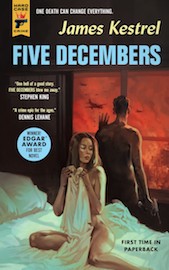 I had heard good things, from American friends, about a novel titled Five Decembers before it was published in the UK in October 2021 and so requested a review copy from the publishers here, Hard Case Crime, an imprint of Titan Books. Sadly, for legal reasons, no copy arrived and when I repeated my request, was told I would now have to wait for a reprint around Christmas. Once again, nothing arrived and, quite honestly, I forgot about it until a notice of a forthcoming paperback in September 2022 rekindled my interest. Not trusting to the generosity of publishers, I actually pre-ordered a copy from a bespoke independent bookseller only for it to finally arrive in late November following a mysterious ‘delay’ in producing the paperback. I had heard good things, from American friends, about a novel titled Five Decembers before it was published in the UK in October 2021 and so requested a review copy from the publishers here, Hard Case Crime, an imprint of Titan Books. Sadly, for legal reasons, no copy arrived and when I repeated my request, was told I would now have to wait for a reprint around Christmas. Once again, nothing arrived and, quite honestly, I forgot about it until a notice of a forthcoming paperback in September 2022 rekindled my interest. Not trusting to the generosity of publishers, I actually pre-ordered a copy from a bespoke independent bookseller only for it to finally arrive in late November following a mysterious ‘delay’ in producing the paperback.
Five Decembers by James Kestrel was, however, worth the wait as it is a wonderfully epic thriller spanning the years of WWII in the Pacific, which does require a slight suspension of disbelief as to what happened in four of those five Decembers, mostly overcome by the good writing on display. And it really is of epic length – I’m guessing it clocks it at around 150,000 words – although the sting in the tail is in the author’s notes where the pseudonymous novelist admits that 60,000 words had been cut from his original manuscript.
But don’t count the words, just read them.
University Challenged
Like many, I am a dedicated fan of University Challenge and enjoy nothing better than shouting at the television when I manage to get a correct answer before either of the competing teams. I particularly revel in the Christmas special editions of the quiz, where teams of university alumni answer slightly easier (oh yes they are) questions.
The teams of alumni – all professionals of a certain age – seem to enjoy the experience, which they do for fun rather than fame or treasure and this year have included numerous crime writers. I could not help but share the embarrassment of one – also a member of the elite Detection Club – who failed to answer the starter question to which the answer was A Study in Scarlet.
Old Writers Telling Tales
I have recently taken part, thanks to the wonders of modern technology, in a ‘podcast’ for the sinister Spybrary organisation, an international cabal of devotees of spy fiction. The occasion was to celebrate the latest novel, Dead Man Telling Tales, by David Brierley published this month by the spanking new independent publisher Safe House Books, who aim to specialise in spy fiction both reviving vintage titles and, as in this case, issuing new work.
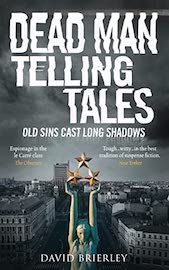
I am, however, familiar with David’s earlier work, having had the privilege of editing new editions of Cold War – his iconic 1979 thriller which introduced female protagonist Cody, a secret agent ‘as tough as tough and resourceful as a Bond or a Quiller’ (according to one expert) – and Big Bear, Little Bear, his 1981 masterpiece set in post-war Europe (the big bear is Stalin, the little one is Berlin) which both The Observer and The Sunday Times put in ‘the Le Carré class’.
I knew David to be an inveterate traveller, as illustrated by the settings of his novels, most notably in countries then behind the Iron Curtain and in the case of Dead Man Telling Tales, Latvia in the early years of this century. Legend has it that he was congratulated on the accuracy of his ‘tradecraft’ in communist Czechoslovakia by a retired CIA operative who had served there.
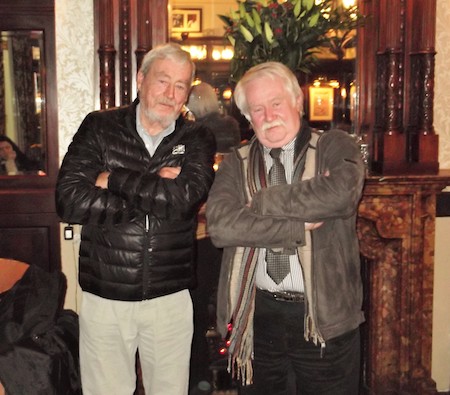
More than a decade ago, we would meet in the private rooms of a distinguished London hostelry whenever David came up to town to buy supplies for his annual back-packing expeditions to south-east Asia and I would occasionally receive a photograph of him relaxing in a hammock in the midst of some dense jungle green somewhere. Our discussions at those sessions, though, were not about globe-trotting but rather the swapping of war stories about publishing and other writers and I remember a significant pang of jealousy when David casually mentioned that he had met both Raymond Chandler and Adam Hall.
More Days of Yore
Over the New Year I was reminded of yet another auld acquaintance whilst paying lip service to my annual resolution to catalogue my personal archive of manuscripts, rejection slips, blackmail notes and letters both threatening and pleasant. As usual, this is a task I never complete, being easily distracted by a piece of nostalgia, in this case, a post card from veteran crime writer Peter Lovesey, dated 21st March 1990.

For some reason I must have sent Peter a copy of my short story Gold Sword, though I cannot think why I did as Peter had never done me any harm, but fortunately he thought it ‘was great fun and deftly plotted. Lovesey awards it *****. What else?’
I have always assumed that Peter’s use of five asterisks meant ‘five stars’ though of course it could be a polite way of deleting an expletive or two. And I have honestly no idea why he thanked me for my ‘expert advice’ or what that advice could have been. Although trawling my memory it might have been something along the lines of ‘keep up the good work and let’s have another two dozen books at least, please.’
I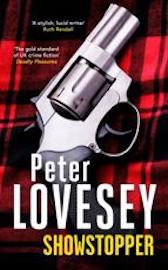 f that was my advice, he certainly took it to heart and indeed has kicked off 2023 with new ‘Peter Diamond’ novel, Showstopper [Sphere]. f that was my advice, he certainly took it to heart and indeed has kicked off 2023 with new ‘Peter Diamond’ novel, Showstopper [Sphere].
In a lovingly-described Bath, police detective Peter Diamond’s latest investigation is into the murky world of television (and the wonderfully-named agents Moore and Moore Talent), in particular the crime series Swift, which is set in the photogenic West Country but, according to Diamond, doesn’t contain much policing. Needless to say, it has proved ridiculously popular with the viewing public.
As Peter Lovesey has a considerable track-record in television (Cribb, Tales of the Unexpected, Rosemary & Thyme, etc), so knows the highs and lows – mostly lows - of working in that medium and has created a very popular fictional detective, this looks like an ideal mix. I am tempted to give Showstoppers at least five stars.
|
|
BOOKS OF THE MONTH
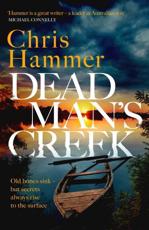
Chris Hammer has found a formula for his own particular brand of what might be called Australian rural noir. He creates an isolated, claustrophobic small town off the beaten track which has a particular environmental threat or problem looming over it, truculent local inhabitants and where there have been murders past and present. Into this lovingly-described and detailed setting he pitches an investigator (a police officer or a journalist) who turns out to have a personal, usually unpleasant, connection to the place. In Dead Man’s Creek [Wildfire], Hammer sticks to his formula, but my goodness doesn’t he do it well! The main investigator here is homicide detective Nell Buchanan, though Hammer’s alter-ego journalist Martin Scarsden does get a name-check, who is called in when a skeleton dating from WWII turns up after an explosive protest by environmental activists. The story unfolds across three narrative strands and Hammer has to keep a lot of plates spinning, but he does it so confidently the result is a thoroughly satisfying crime novel.
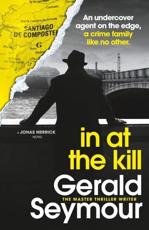
As fictional spies go, Jonas Merrick makes George Smiley look like a hyper-active teenager hooked on Grand Theft Auto and is known to his colleagues as ‘the eternal flame’ because he never goes out. Nonetheless, he is a fascinating character, created by veteran thriller writer Gerald Seymour and making his third appearance in In At The Kill [Hodder]. From his office, where he is surrounded by disapproving (much younger) colleagues, or from his touring caravan with only his cat for company, Merrick masterminds an operation which involves an undercover agent laundering dirty money for a crime syndicate in Spain, the surveillance of a notorious criminal family in Liverpool and industrial quantities of cocaine being shipped in a ‘semi-submersible’ from South America. Even for a man whose mantra is to neither confirm nor deny anything, Jonas would have trouble refuting the fact that this was a tricky one. In At The Kill is a modern spy story with background ripped from the headlines and shows that Seymour has lost none of his appreciation for good espionage tradecraft.
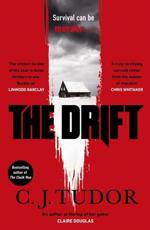
C.J. Tudor’s new thriller The Drift [Michael Joseph] is not really a crime novel even though there are numerous murders in it (quite a lot, actually) and, at first sight, three distinct ‘locked room’ scenarios where murders have and will take place: an isolated scientific research facility (?), a wrecked coach with some of its passengers already dead stuck in a snow drift, and – in the tradition of Where Eagles Dare – a gaggle of passengers hanging in a disabled cable car. What (and when) links these incidents? They all take place is a dystopian world ravaged by a virus (no prizes for guessing when this was written) and if there isn’t an actual zombie apocalypse, Tudor provides the next best thing... I believe Stephen King is a fan, which comes as no surprise.

I have only myself to blame for being slightly disappointed in Katja Ivar’s new novel Trouble [Bitter Lemon] as I am a declared fan of her Finnish police detective (now gone private), Hella Mauzer. Given the setting – Finland in 1953 and a very private investigation into the murder of her father, a senior intelligence officer in 1942 – I had hoped to learn more about Finland in both the Cold War and the two wars with Russia in the 1940s, known as the Winter War and then the Continuation War, before the Finns broke their uneasy alliance with Nazi Germany. I was also curious about the SUPO, the Finnish intelligence service, about which I was disgracefully ignorant. Trouble, however, concentrates on two ‘cold case’ murders, one Hella discovers and one she has always suspected and she manages to dovetail them into a satisfying, if not exactly legal solution. The strength of the book is the portrayal of how women were – and possibly still are – treated. The blatant sexism would be jaw-dropping were it not so credible.
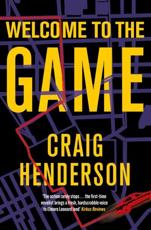
If there are any drug-taking petrol-heads out there dying for an Elmore Leonard-style thriller, then the wait might be over with the debut novel of Craig Henderson, Welcome To The Game [Grove Press]. Written by a Brit, with an English central character, but set firmly in Leonard Land (i.e. Detroit), this is an urban thriller of gangs, gangsters, money laundering and driving – lots of driving, which considering the single-parent hero is a hard drinking, coke-snorting, dope-smoking bankrupt dealer in ‘super’ cars, would make several segments on Top Gear. The action is fast and furious (sorry about that), the plot over-complicated with too many minor characters and the violence is cold and cruel. It’s not up to Elmore Leonard’s standard – but what could be? – and although the baddies are impressively bad and genuinely scary, the English fish-out-of-water (except he doesn’t think so) fails to register as either sympathetic or, more importantly, ‘cool’. Along the way, he takes an incredible amount of physical damage which, at times, you think serves him right.
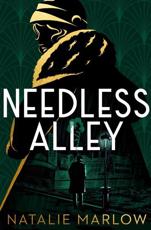
Brimingham 1933, smelly canals, narrowboats and blackshirts from the British Union of Fascists lurking behind the gasometers, but no Spartan haircuts so this is not Peaky Blinders. William Garrett is a private enquiry agent with an office in Needless Alley [Baskerville] by Natalie Marlow, whose speciality seems to be arranging the scenes of adultery required as evidence in a divorce case. Hired by a seedy, but connected, local bigwig to follow his much younger wife, Garrett also finds himself recruited by the wife against his client. Naturally he falls for the (totally innocent) unhappy wife and a slightly toe-curling seduction ensues. Then a shocking double murder puts the plot into overdrive and Garrett, now up to his neck in cocaine and pornography, cuts through friend and family connections to dish out a brutal justice. There may be a couple of instances of anachronistic dialogue and one there is one expression I had never heard before: ‘a twelve-bob note’. Nine, yes, but never twelve.
Re-issues of the Month
I am overjoyed to report that three more Eric Ambler thrillers have joined the ranks of Penguin Modern Classics in impressive new art-deco livery. The three novels date from the period 1959 to 1964 and, some might argue may be post peak-Ambler, but I maintain that the entire Ambler canon is worth reading and re-reading and for any aspiring thriller writer, reading should be compulsory.
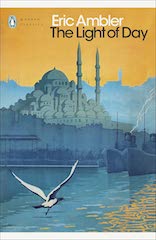 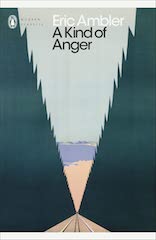 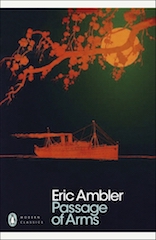
The new editions are The Light of Day (famously filmed as Topkapi), A Kind of Anger and Passage of Arms.
Don’t forget: it’s drink
January dry month.
The Ripster.
|